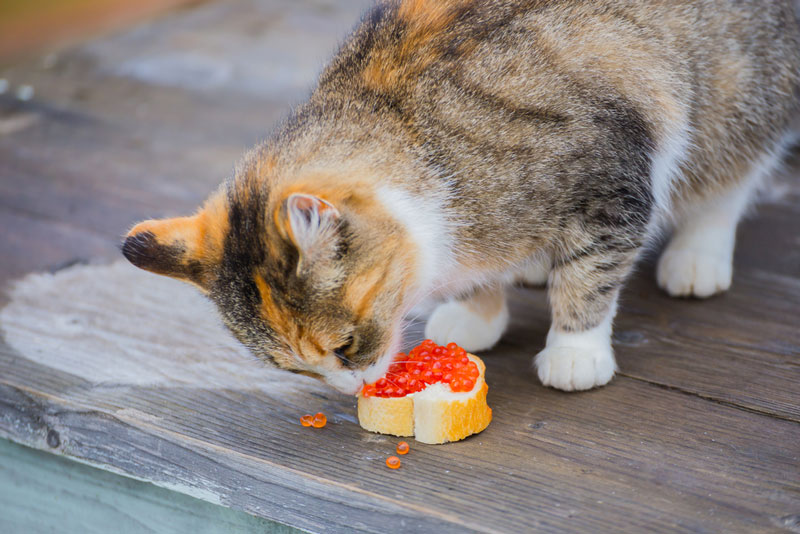It’s a question that might pop into your head during a fancy dinner party: can cats eat caviar? You might imagine your sophisticated feline lounging in a velvet chair, elegantly nibbling on those little fish eggs. The truth is, yes, cats can technically eat caviar, but that doesn’t mean it’s a good idea. While caviar is not toxic to cats, it is not a natural part of their diet either. Their usual fare is much simpler, typically consisting of protein-rich treats like fish and meat. So, while it’s okay for an occasional indulgence, it’s best to keep caviar as an occasional cat treat rather than a regular menu item.
What makes caviar so peculiar is its luxurious status. The thought of a tiny feline savoring a gourmet dish is both amusing and fascinating. But let’s not forget, cats are carnivores, primarily thriving on the proteins found in meat. Trying to introduce your kitty to this flashy delicacy could lead to confusion and curiosity that we might not want to encourage. So, while they can eat caviar, it’s not something we should make a habit of for our furry friends!
Curious about what caviar means for your cat? Well, let’s explore this intriguing topic together! We’ll discuss not only whether our feline pals can indulge in caviar but also how much they should have, the potential benefits, the risks involved, some tasty substitutes, and answer some of the frequently asked questions. Stick around as we unravel the mysteries of this luxurious fish roe!
Can Cats Eat Caviar?

When it comes to treating our beloved cats, we often find ourselves questioning the safety and health benefits of certain foods. Caviar, with its glamorous reputation, might not be the first thing that pops into our minds as a potential snack for our furry friends. But is it safe for them? Well, we’ve mentioned that cat owners can let their pets have a bite from time to time, so what gives?
Caviar is made up of fish eggs, typically from sturgeon, and they can be a high source of protein and omega-3 fatty acids, which are excellent for our health. But our cats’ digestive systems are distinctly different from ours. Cats primarily need animal proteins to thrive, and caviar, being a processed food, does not equate to the freshness and nutrition of real fish meat. While it doesn’t contain harmful chemicals or additives, it can be too salty for our little companions.
We love spoiling our cats with cat treats or small bits of fish, but indulging them with caviar should definitely be done in moderation. Cats are naturally inclined to be wary about new foods, so it’s pretty unlikely that your kitty would dive headlong into a bowl of caviar anyway. If a little caviar finds its way into their paws, it may not cause harm, but make sure you don’t substitute this for a balanced diet.
How Much Caviar Can Cats Eat?
Now that we know our feline friends can eat caviar occasionally, the question arises: how much is too much? As pet lovers, we all want to give our kitties the best, but moderation is key. Since cats’ diets should primarily consist of meat (like their beloved chicken or tuna) as opposed to fish eggs, we need to approach caviar with caution.
Typically, a small amount—say, a quarter or half a teaspoon—would be enough to satisfy a curious cat without overwhelming its system. Think of it as a special treat rather than a staple. We wouldn’t want to jump onto the trend of cat gourmet dinners that can leave our pets confused about what food actually constitutes their balanced diet. So, for those special occasions, let’s keep it light; allow them to nibble, but not enough to replace their everyday sustenance.
Let’s always remember to take into account our own pets’ size, health condition, and preferences when feeding them caviar. Cats have individual food sensitivities, and caviar, because of its salt level, can be a tad rich. Generally speaking, it’s perfectly fine to allow this luxury as an occasional treat, but definitely not as a regular occurrence. After all, our goal is to keep our cats healthy and happy!
And let’s not forget about younger kittens. They have even more sensitive tummies than our adult cats, so it’s best to save caviar for adults only when indulging is deemed safe. Keep an eye on your furball after introducing any new food, and if you notice any unusual behavior—whether it’s an upset tummy or general discontent—better to skip that caviar next time!
Benefits Of Caviar To Cats
1. Protein Content: The first big benefit that comes to mind is the high protein content caviar contains. For cats, protein is vital because it aids in maintaining their energy levels, helps with muscle development, and keeps their coat sleek and shiny. Even though our feline companions would be far better off munching on real fish or meat, caviar does pack a protein punch!
2. Omega-3 Fatty Acids: Let’s talk about the fabulous omega-3 fatty acids found within caviar. These little buggers work wonders for our health and ours as well! They can contribute to heart health, improve vision, and even support a healthy immune system. We want our kitties to thrive, right? So, a little sprinkle of caviar could lend a hand in enhancing their overall health, as long as it’s done occasionally.
3. Luxury Treat: Let’s face it; cats deserve a little luxury in their lives. A tiny morsel of caviar could be viewed as a “special” treat. Think of it as a way to celebrate your cat’s accomplishments! A friendly cuddle session or a successful trip to the vet! It’s lovely to pamper our furry friends from time to time
4. Flavor Variety: Just like humans, cats can become bored with their routine foods. Introducing caviar can provide a new flavor experience that creates excitement in their dining routine. Of course, we should always ensure that the primary food remains meat-centric, but a dab of caviar may be just what it takes to tantalize their taste buds!
5. Bonding Moments: Finally, we can all agree that sharing food can strengthen our bond with our furry friends. When we treat them to something special, it turns into a heartwarming experience, coupled with happy chirps of approval. It’s cozy to watch your cat thoroughly enjoy something different. When we set aside meal times as bonding moments, we reinforce our connection that’s so vital for our pets!
Dangers Of Feeding Caviar To Cats
While the thought of letting our cats indulge in caviar may seem glamorous, there are some risks we need to consider. After all, our pets’ health is a top priority! It’s essential to weigh the pros with the potential risks involved when introducing this exquisite dish.
One significant concern is sodium levels. Since caviar is usually salty, it may not sit well in our cat’s stomach. A high salt diet isn’t exactly ideal for our little fluffy friends, as it can lead to serious health issues such as dehydration or strained kidneys. It’s our responsibility to monitor how much salt our pets consume to maintain their health in tip-top shape!
Another factor to think about is allergies. Just as humans can develop food sensitivities or allergies, cats can too! For some cats, the introduction of a new food like caviar might cause an upset stomach, or worse: allergic reactions. Symptoms may vary from mild factors like sneezing to more serious issues like vomiting. We would hate to see our kitties feeling unwell after a lux treat!
Then there’s the little matter of a balanced diet. Caviar should never become the substitute for wholesome cat food. While it might make for an exciting treat, it’s crucial for our pets to experience a well-rounded diet to ensure they’re getting all the nutrients they need. If we opt for too many meals centered around caviar, we risk depriving them of essential vitamins and proteins!
Lastly, there’s a potential for overeating. When we introduce tasty new treats, it’s easy to get carried away. Felines can easily devour more than what we initially intended! Keeping treats to moderate sizes helps us minimize the risk of obesity in our precious pets. It’s essential to watch portion sizes to keep them healthy and prevent munchies from transforming into an overwhelming habit!
Substitute Of Caviar For Cats
1. Dried Fish Treats: If your furry companion enjoys seafood flavors, a great substitute for caviar could be dried fish treats. These crunchy delights are often available in pet stores, and they’re rich in protein while carrying none of those excessive sodium levels. We can keep our furry munchkins happy with these crunchy protein-packed bites!
2. Tuna: If our little kittens adore fish, mixing in bits of tuna can harmonize wonderfully with mealtime! Canned tuna, especially in water (not oil), provides our cats with tasty protein without unnecessary additives. Just keep an eye on their tuna intake; moderation is key.
3. Cooked Fish: Spoiling our cats with some cooked fish might beat caviar in terms of health benefits! Bake or steam fish—like salmon or mackerel—for a delightful treat that can boost omega-3s while keeping it healthy. Remember to save the seasoning and spices; kitties love them plain!
4. Catnip: Not everything for our feline friends needs to be focused on food. Yes, it can be fun to introduce a little catnip! This playful herb can entice our cats, giving them a chance to enjoy something different without any health concerns!
5. Commercial Cat Treats: Our final alternative could be the plethora of commercial cat treats available specifically designed for feline palates. These often come with added nutrients and flavors they’ll love, while still being safe and healthy for their consumption.
Can Cats Eat Caviar? Frequently Asked Questions
Is Caviar Safe For Kittens?
Although caviar isn’t toxic for kittens, we should always approach new foods with caution. It’s generally best to keep them away from any rich food. Young kittens require a specialized diet to grow and thrive properly. Stick with age-appropriate kitten food, and save the caviar for adult cats!
Can All Cats Eat Caviar?
Yes, all cats can eat caviar in moderation. However, it is vital to consider their individual circumstances. If a cat has existing food allergies or health concerns, it might be best to skip the caviar altogether. Consult with a veterinarian if you’re unsure!
How Often Can Cats Eat Caviar?
We should treat caviar as an occasional lux snack rather than a diet staple. Once a month could be a good rule of thumb to limit intake and keep things exciting without going overboard. Balance is key when it comes to proper nutrition.
If My Cat Eats Too Much Caviar, What Should I Do?
If our feline friend devours too much caviar, monitor for potential symptoms such as vomiting or diarrhea. It’s essential to keep water nearby and ensure plenty of hydration. If symptoms persist or your cat seems overly distressed, contact a veterinarian immediately for guidance.
What Are Some Other Fancy Foods Cats Can Enjoy?
Aside from caviar, our cats may also enjoy cooked shrimp, chicken, or plain pumpkin! Always check ingredients first and ensure treats are prepared safely without spices!
Final Thoughts
So there you have it, the delightful yet cautious world of caviar for our cats! While it may be entertaining to give our furry friends a taste of this luxurious treat, our emphasis should be placed on moderation and awareness of potential risks. Keeping our pets healthy and happy is always the ultimate goal!
If you fancy more fun and intriguing articles, don’t hesitate to explore topics like pet care advice, or check out what happens when cats have a taste for Cheese or Eggs. The options are endless! Happy reading, and may your furry companions bring you endless joy!


